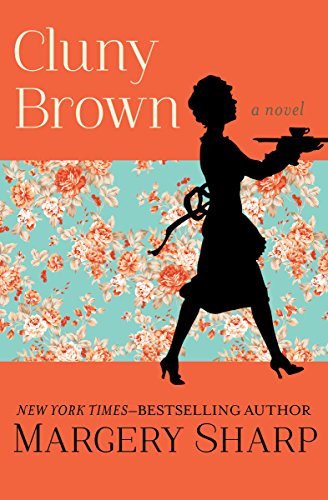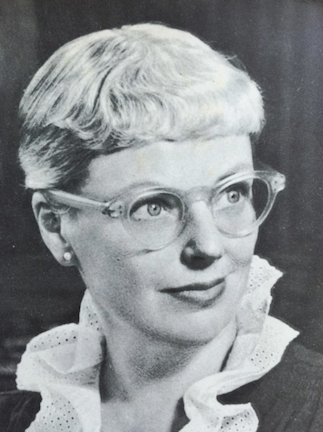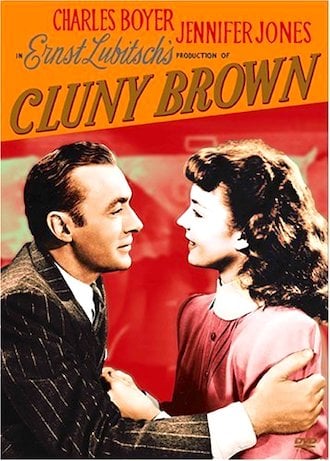Cluny Brown by Margery Sharp (1944)
By Taylor Jasmine | On October 19, 2017 | Updated February 14, 2024 | Comments (2)

Possibly the best-known novel for adults by British author Margery Sharp, Cluny Brown (1944) is a comic novel following the title heroine’s quest for love, freedom, and experience.
Cluny Brown works as a parlor maid in a country inn called Friars Carmel and there, she encounters a motley cast of characters. The novel, aside from being great fun to read, is a satirical look at British high society in the mid-twentieth century.
The novel was plucked from its British locale and adapted into an American romantic comedy in 1946. It was produced and directed by Ernst Lubitsch (it was the legendary director’s last completed film) , starring Charles Boyer and Jennifer Jones.
The following description from the 1944 American edition (Little, Brown & Co.) of Cluny Brown:
Cluny Brown has as much sense as most girls, she’s willing, good-tempered, tall, not “a Lovely.” Occasionally someone says: “The trouble with her is she doesn’t know her place.” Cook says she always looks “pro tem.”
Betty Cream says she looks like “someone.” Reactions may come from the fact that she once had tea at the Ritz and once stayed in bed all day Sunday, eating oranges to relax the nerves.
She’s niece to a plumber who, thinking she should go into service instead of dipping into the experience of being seduced, ships are off to Friars Carmel in Devon, a country houseowned by Sir Henry and Laday Carmel. But life can never be simple when Cluny is around. It is still less simple when Sir Henry’s son Andrew visits his parents there. The beautiful Betty Cream doesn’t help matters.
. . . . . . . . . .

. . . . . . . . . .
And if the famous Polish writer, Mr. Belinski, had not been invited to stay for a while — well! Lady Carmel is perhaps more absorbed in floral arrangements then she is in the Polish question, while Sir Henry absent-mindedly writes letters to friends in Zanzibar and Tanganyika to occupy his time, which can no longer be spent in the saddle.
Will Betty Cream marry Andrew? Why does Cluny seem to confuse everyone? Why does the village chemist go to London? What is Adam Belinski going to do in order not to stay at Friars Carmel all his life — and how do he and Cluny Brown suddenly startle the reader and solve the plot?
. . . . . . . . . .

Learn more about Margery Sharp
. . . . . . . . . .
Quotes from Cluny Brown
“Standing there in her cotton nightdress, in a draught, her bare feet on the bare linoleum, she felt quite extraordinarily well, all over, except for one spot on her upper lip, which was rather sore from sucking oranges.”
. . . . . . . . . .
“The correct costume for a young lady going to fix a gentleman’s sink on a Sunday afternoon has never been authoritatively dealt with; Cluny had naturally to carry her uncle’s toolbag, but as an offset wore her best clothes.”
. . . . . . . . . .
“No mention has so far been made of Cook because she was merely a temporary … In her own kitchen her personality was a rather interesting one, unusually sardonic, as she herself was unusually thin, and expressing itself in savouries and sharp sauces.”
. . . . . . . . . .
“If you had a smattering of education you would realize that perfection of form can give validity to any sentiment, however preposterous.”
. . . . . . . . . .
“Every word he spoke made Cluny feel more like an orphan. (Usually she did not feel like an orphan at all.) But his sympathetic interest was very agreeable, and she instinctively played up to it by looking sad. Cluny could look sad very easily, she had only to drop long dark lashes on a colourless cheek.”
. . . . . . . . . .
“We pray, give us this day our daily bread—not our daily caneton à la presse. Luxury should be the détente after work, the riot after abstinence, one should not become used to it.”
. . . . . . . . . .
“Gazing on the thousands and thousands of books — they looked to her like millions and millions — Cluny felt her heart sink. She had none of the library user’s technique: to find four lines, in all that, struck her simply as looking for a needle in a haystack.”
. . . . . . . . . .
“It is surely better that people should hear of Balzac, even through the medium of his amours, than that they should not hear of him at all?”
. . . . . . . . . .
“She asked whether he did not get a terrific kick out of seeing he writings in print, and Mr. Belinski, possibly misunderstanding the colloquialism, replied that there were many things he’d like to give a terrific kick to, but books were not one of them.”
. . . . . . . . . .
“Seeing a small quarrel flare up on the tennis court, did Sir Henry put it down to youthful high spirits alone? His wife did not. Her constant talk, in the evenings, of gardens and window-boxes, was not undirected; she was well aware of its soothing, almost soporific effect on the lay mind.”
. . . . . . . . .

Cluny Brown (1946 film)
. . . . . . . . . .
Cluny is sent to work as a parlour maid at the large country house of Sir Henry and Lady Carmel – not a country inn.
Thank you for that; I’ll correct it now!